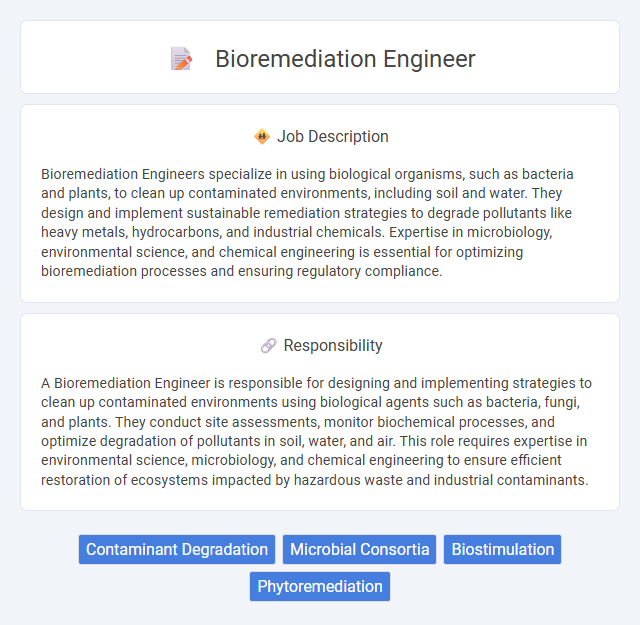
Bioremediation Engineers specialize in using biological organisms, such as bacteria and plants, to clean up contaminated environments, including soil and water. They design and implement sustainable remediation strategies to degrade pollutants like heavy metals, hydrocarbons, and industrial chemicals. Expertise in microbiology, environmental science, and chemical engineering is essential for optimizing bioremediation processes and ensuring regulatory compliance.
Individuals with a strong background in microbiology, environmental science, or engineering are likely to excel as Bioremediation Engineers due to the technical knowledge required for developing and implementing pollution cleanup strategies. Those who enjoy working outdoors and handling complex environmental problems may find this role particularly suitable, given the hands-on nature and fieldwork involved. However, people who prefer routine tasks or limited environmental exposure might not find this job fulfilling or appropriate for their interests and conditions.
Qualification
Bioremediation Engineers typically require a bachelor's degree in environmental engineering, microbiology, or a related field, with many positions favoring candidates holding a master's degree for advanced project roles. Proficiency in environmental science, soil chemistry, and microbiological techniques is essential, alongside experience in site assessment and the application of bioremediation technologies. Professional certifications such as the Board of Certified Environmental Engineers (BCEE) can enhance job prospects and demonstrate a commitment to industry standards.
Responsibility
A Bioremediation Engineer is responsible for designing and implementing strategies to clean up contaminated environments using biological agents such as bacteria, fungi, and plants. They conduct site assessments, monitor biochemical processes, and optimize degradation of pollutants in soil, water, and air. This role requires expertise in environmental science, microbiology, and chemical engineering to ensure efficient restoration of ecosystems impacted by hazardous waste and industrial contaminants.
Benefit
A Bioremediation Engineer likely improves environmental health by utilizing natural processes to clean contaminated sites, reducing the need for harmful chemicals and expensive disposal methods. This profession probably enhances sustainability efforts and supports ecosystem restoration, offering valuable contributions to public health and regulatory compliance. The role may also provide opportunities for innovation in waste treatment technologies and long-term cost savings for industries and communities.
Challenge
Bioremediation Engineers likely face complex challenges related to developing effective biological solutions for contaminated environments, requiring deep knowledge of microbiology and environmental science. The unpredictability of site-specific conditions can pose significant obstacles in optimizing the degradation of pollutants. Finding sustainable, cost-efficient methods while complying with regulatory standards may also add layers of difficulty to the role.
Career Advancement
Bioremediation engineers specialize in using microorganisms to clean up contaminated environments, a field experiencing rapid growth as environmental regulations tighten globally. Career advancement opportunities include roles such as project manager, environmental consultant, or research scientist, often requiring advanced degrees or specialized certifications in environmental engineering or microbiology. Expertise in cutting-edge biotechnologies and regulatory compliance significantly enhances prospects for leadership positions and higher salary brackets within environmental firms and government agencies.
Key Terms
Contaminant Degradation
Bioremediation engineers specialize in contaminant degradation by utilizing microorganisms to break down hazardous substances in soil and water. Their expertise includes optimizing environmental conditions to enhance microbial activity, effectively reducing pollutants such as petroleum hydrocarbons, heavy metals, and chlorinated compounds. Advanced techniques like bioaugmentation and biostimulation are employed to accelerate the detoxification process, ensuring sustainable remediation of contaminated sites.
Microbial Consortia
Bioremediation Engineers specializing in microbial consortia optimize the use of diverse microbial communities to degrade environmental pollutants effectively. Their work involves selecting and engineering specific strains to enhance contaminant breakdown in soil, water, and industrial waste. Expertise in microbial interactions and metabolic pathways is crucial for developing sustainable bioremediation strategies.
Biostimulation
Bioremediation engineers specializing in biostimulation enhance the natural microbial degradation of contaminants by optimizing environmental conditions such as nutrient levels, oxygen availability, and pH. They design and implement tailored strategies to accelerate the breakdown of pollutants in soil and groundwater, improving remediation efficiency. Their expertise integrates microbiology, environmental engineering, and chemical analysis to restore contaminated sites sustainably.
Phytoremediation
A Bioremediation Engineer specializing in phytoremediation applies plant-based technologies to remediate contaminated soil, water, and air by absorbing, degrading, or stabilizing pollutants such as heavy metals, hydrocarbons, and pesticides. Expertise in selecting hyperaccumulator plant species, optimizing root zone conditions, and monitoring biodegradation rates is essential for effective site restoration. Skills in environmental sampling, data analysis, and designing sustainable remediation systems contribute to reducing ecological risk and promoting ecosystem recovery.
 kuljobs.com
kuljobs.com